“Hussar Ballad”: hussars, mentik and pistols - the best historical comedy film in the history of Russian cinema!
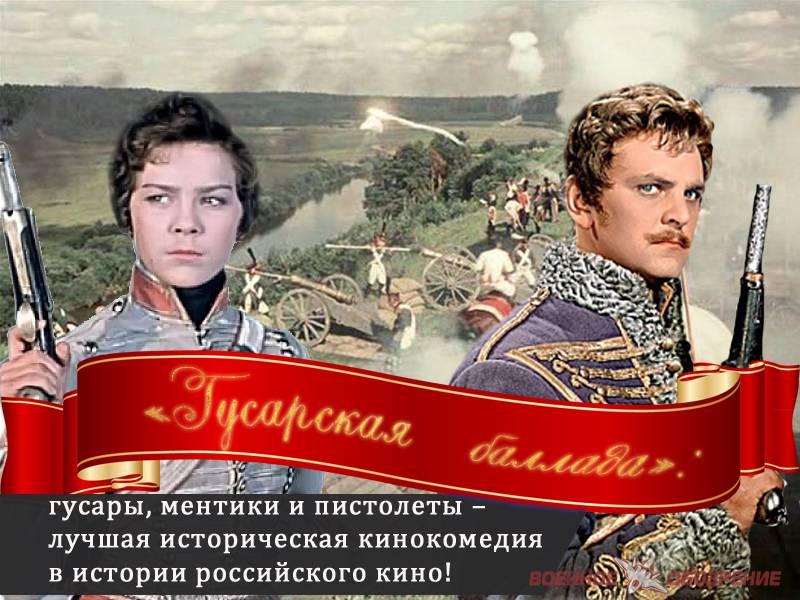
Bless me
And a memorable willow
I rustle quietly:
No higher share in the world
Dream, love and sing
And at home freedom, freedom
Fighting, die.
(The charming woman is young. Music by T. Khrennikov, lyrics by A. Gladkov)
Military movies were always shot. Like movies on historical themes. They shot it in the USSR, as, however, they shoot it now. Moreover, even then there were stupid ministers who knew everything around the world, there was censorship and “telephone law”, there were leaders who pointed out to the directors what was good and what was bad in the film. However, despite all this, for some reason, such masterpieces of world military-historical cinema as “Alexander Nevsky”, “Peter the Great”, “Battleship“ Potemkin ”,“ Cranes are Flying ”were shot with us. But there is such a wonderful, military, patriotic, sparkling, provocative movie on this list as ... "Hussar Ballad"!
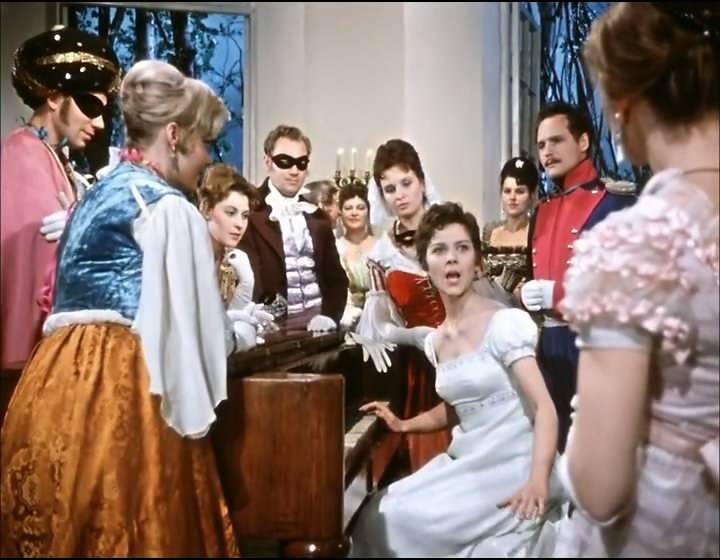
"... And in his native liberty, liberty / Fighting, die." And the music, and the words ... Done right!
Shurochka Azarov, lieutenant Rzhevsky, Kutuzov ... For fans of Soviet cinema, these were not just the characters of this movie, shot in the comedy genre, behind them were real images of the heroes of World War 1812 of the year. The brilliant play of actors, the highly professional work of the director, the magnificent screenplay all together resulted in an interesting, easy, but memorable film. Although the fate of this film was not at all simple, and how many obstacles E. Ryazanov, the director, had to overcome, the director knew, probably, only him. But first things first…
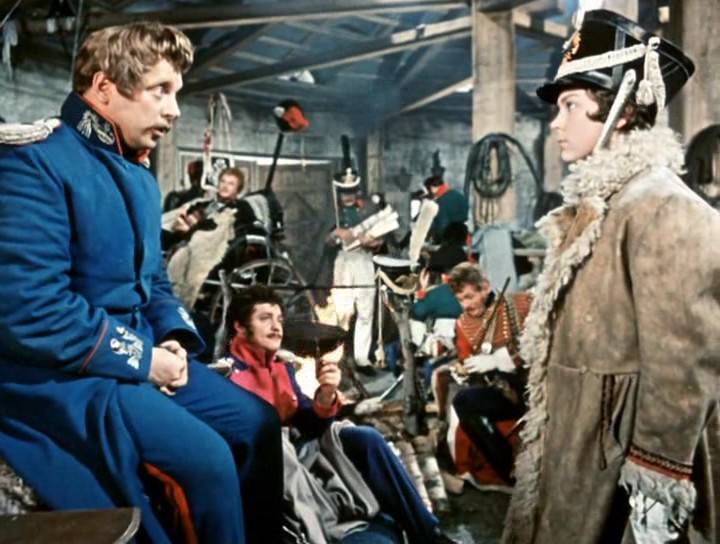
Left Guards Cossack, right Shurochka in a sheepskin coat. And yes, that was exactly the way 1812 was in the winter.
In the beginning was the play. Its author, Alexander Gladkov, to sit down at the feather pushed childhood memories. Then, in early childhood, in two winters mom read aloud to little Sasha and his brother two very serious books - “Children of Captain Grant” and “War and Peace”. The children's imagination so vividly painted the plot pictures that it sometimes seemed to Sasha that he himself participates in the events of 1812 of the year, hears the sounds of gunfire, sees the galloping horsemen and feels the smell of powder smoke. Therefore, when in the autumn of 1940, he had the idea to write a play about the 1812 war of the year, in a strange way in the imagination of Gladkov the long-standing impressions of “Children of Captain Grant” and “War and Peace” were combined into one whole. And it became clear that the play should be born, and certainly fun.
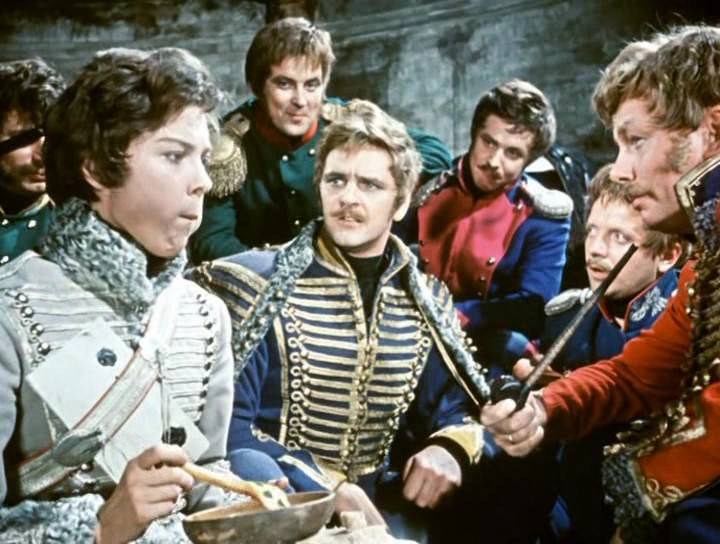
Vyushka, sewing, buttons - all reliably on all 100%!
The Revolution Theater, the first to take the play, began production only in 1943 in the city of Tashkent. Theater artist P.V. Williams managed to make magnificent sketches of the scenery for the play even before the evacuation, but in a terrible evacuation rush all the materials for the play were irretrievably lost, and in Tashkent I had to ask another artist to help with the decoration of the scenery. As Gladkov recalled, he remembered to the smallest detail all the principles of making mock-ups, but during evacuation all copies of the play that were at that time in the theater were lost.
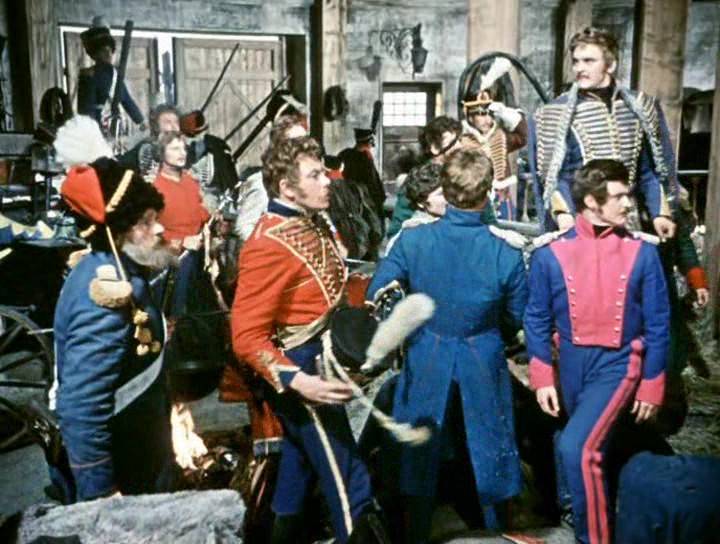
Partisans. What are the types and models of uniforms: a Cossack with a beard on the left, a lancer on the right, a life guard hussar officer in the center ...
Meanwhile, even in 1941, in the besieged Leningrad, on the day of the celebration of the anniversary of the October Revolution, this performance was shown in the unheated theater. And the author of the play himself found out about this several days later, after reading a note in the Pravda newspaper.
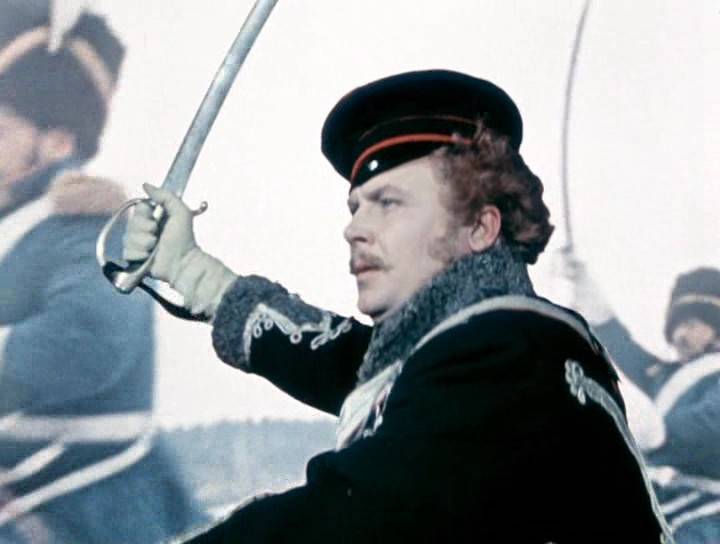
And this is the Alexandria Hussar Regiment - the whole uniform is black with white embroidery. But in the feed cap, the shako is apparently lost.
Well, and Eldar Ryazanov, who became the film director of this work, first saw this production in 1944 at the Theater of the Soviet Army. And 17 years later, the young director wanted to film him. Especially since the date was approaching - 1962 year, and the dates in the USSR were taken very seriously!
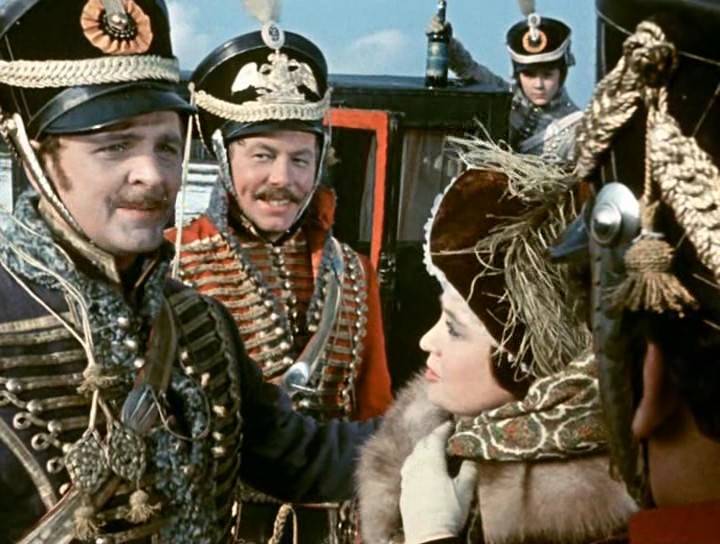
Lieutenant Rzhevsky was left “in blue”, that is, judging by his uniform, he was a hussar of the Mariupol hussar regiment: yellow sewing, yellow collar. Behind him is the hussar of the Life Guards of the Hussar Regiment, as can be seen from its red mentic, blue chakchiras and eagle on a shako. In all the other hussar shelves on the shako there was a "socket".
And in the spring of 1961, Ryazanov rereads the play “Once upon a time”. Cheerful, mischievous, she just asked for a film. The occasion was quite appropriate: in September 1962, the whole country had to celebrate 150 years from the day of the Battle of Borodino. But this occasion became at the same time a serious obstacle: a great anniversary of a great historical event and suddenly a comedy film ?!
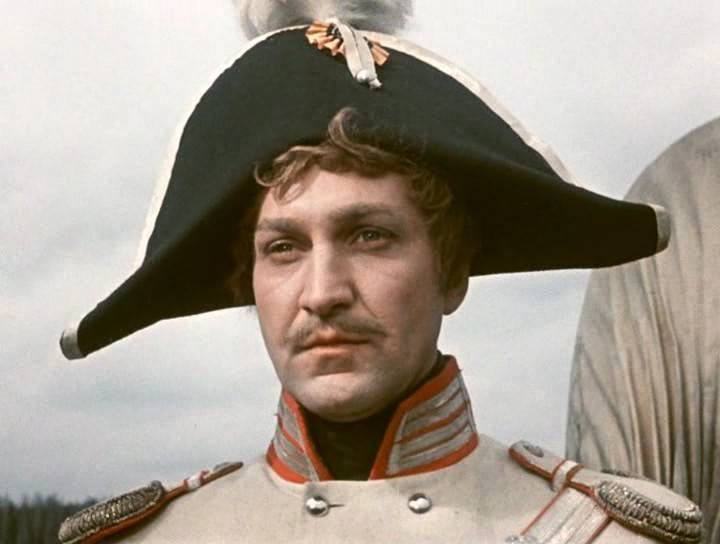
Knightguard Pelymov. How did he come to the partisans?
For Ryazanov, the “Hussar Ballad” was the first film based on historical material, and this was the first screen version of the play. At that time, the play “Once upon a time” was known to both theater-goers, and spectators, and Ryazanov had a very serious task: to make a picture no worse than the original. As conceived by the director, this was supposed to be a genre that would unite both the heroic comedy and the charming vaudeville with the transformation of the girl into the cornet, and the love story so that it was not in the last place.
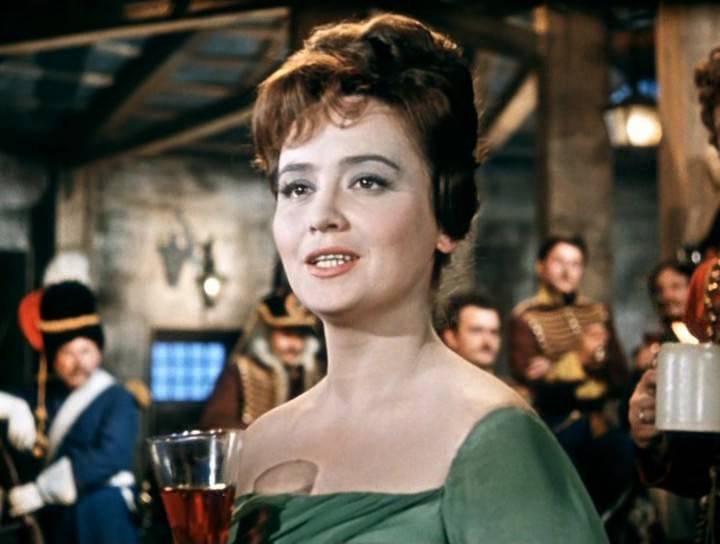
Tatiana Shmyga in the role of Germon Louise: “Call me, my dear chosen one, let's forget what happened, my dear chosen one!” That's how she fooled Pelymova, and she achieved hers in the end!
Both according to the scenario and in the play itself, the role of the national commander Mikhail Illarionovich Kutuzov is not the main, but sign and important. Comedic actors were chosen for all the roles, and Ryazanov had no doubt that Field Marshal Kutuzov should also be a comedian. But at the same time, Kutuzov will not be funny, but will be kind and wise. And Ryazanov offered his old friend Igor Ilyinsky to play Kutuzov, but he flatly refused. There are several reasons: too small, almost episodic role, not serious for an actor of this magnitude. And yet, by age, Ilinsky was younger than the field marshal in 1812. Therefore, playing the old man, it could not be very natural. Ryazanov tried as best he could. He persuaded, and lied that the whole studio only dreams that he played this role. Finally persuaded.
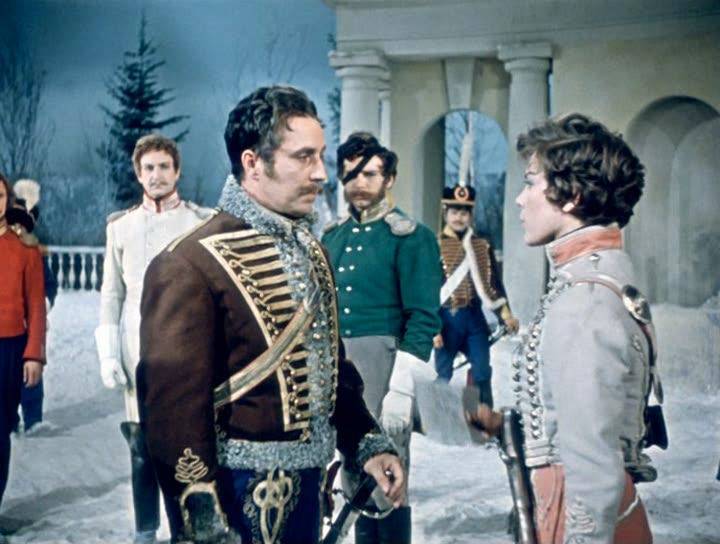
"Davyd Vasilyev - commander of the partisans." Obviously, meaning the legendary hussar partisans Denis Davydov. And if so, then yes, that's right: he is wearing the uniform of the Akhtyrka hussars, in which he served: brown mentik, blue chakchirs.
Snow in some episodes of the movie was scented with ... naphthalene. Yes, yes, in the movie and it does not happen. Especially when the winter season is removed almost in the summer. And according to the scenario, the action takes place in the bitter cold! The problem, while the director called it “the hunt for the snow”, was solved like this: the courtyard of the estate, built of a dilapidated church, absolutely the whole crew was covered with the remnants of spring snow. Top it sprinkled with sawdust, then a layer of chalk and ... mothballs. The roof of the house where Shurochka Azarova lived was simply painted white. Railing overlaid with cotton wool, also sprinkled with mothballs. The works were not in vain: the illusion of a frosty, snowy winter was complete. It was more difficult with horses, equipment and pyrotechnics. The actors fought with fake wooden sabers and turned them into the excitement of battle.weapon"In a large wood pile.
“Would you like to give you a pillow? - Oh, what are you, what are you? I am not worthy of such mercy! “I embroidered it with my own hand, although the drawing is not new” - this was the way the ladies flirted with gentlemen
But everything was bathed in the main thing - by the excellent duo of Shura and lieutenant Rzhevsky. There were plenty of candidates for these roles, and these were already “movie stars”. Trying to be a lieutenant and Lazarev, and adored by Ryazanov Tikhonov, and Jurassic. And yet, Yuri Yakovlev won. And all would be fine, but when it was necessary to shoot scenes where he rides a horse ... they sat him in the saddle seven people at a time. The horse carried off the bat, and Yakovlev was just lucky that she had not dropped him on the ground.
There were also several candidates for the role of Shurochka, one more worthy than the other: Alisa Freindlich, Svetlana Nemolyaeva, Lyudmila Gurchenko. But something they all lacked. A suitable actress was a young student, a young Larisa Golubkina. The role of Shurochka Azarova was for her debut. So why did Larisa Golubkina come up for the role of Shurochka-Cornet? Thin waist, boyish-girlish become, a clear voice, and most importantly ... there is nothing yet - "neither here nor there."
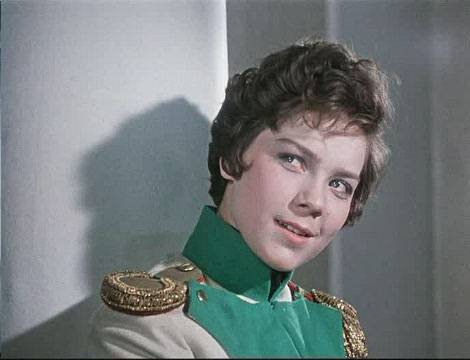
"The uniform of the Navarre shooters ..." And Golubkina is also going very well. And you imagine in it Alice Friendlich of that time? One laugh, and only!
Larisa later admitted that she was terribly afraid of mice, and also to jump from a height. But, having gained courage, she nevertheless jumped from the second floor, and, unfortunately, after several takes she injured her leg. The injury made itself felt for a very long time. However, it was worth it! The picture was so successful that many perceived it as the true story of the cavalry maid Nadezhda Durova. Although there was very little in common between these two women, perhaps participation in the Patriotic War of the 1812 of the year, and personal acquaintance with Kutuzov. The uniforms and those were different. Nadezhda Durova served in the Lancers. The hussar uniform was beyond her means!
When the film was shot and a copy was sent to the Ministry of Culture, Ekaterina Furtseva, the USSR Minister of Culture, visited the studio. Ryazanov recalls: "I went to push myself into the director's dressing room, hoping to see the minister, find out if she looked at the picture and what was her opinion." Furtseva he caught the eye. Ekaterina Alekseevna was extremely dissatisfied and spoke rather harshly about Ilinsky as Kutuzov. The minister was categorically against the comedian actor who played Ogurtsov in Carnival Night, and now received the role of a great commander. Furtseva was indignant. Given that the talent of Ilyinsky was valued by the minister very highly, nevertheless, she considered it tactless that he had to play the role of the great Kutuzov. And the viewer, in her opinion, will certainly meet his appearance with a laugh.
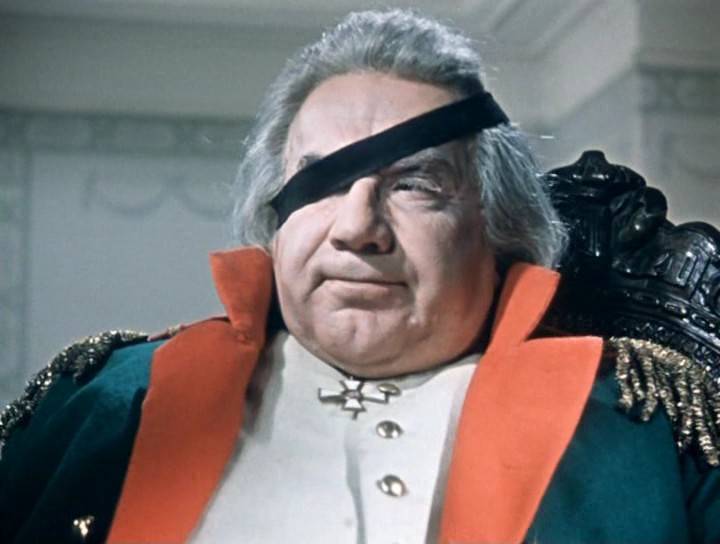
Here it is - Igor Ilinsky in the role of Kutuzov. And what's bad?
But then it happened that in the editorial office of the newspaper "Izvestia" shortly before the anniversary date, a new picture was viewed. There was nothing strange about it. The editorial staff of each major newspaper was assigned one day a week to watch a new film, or a creative meeting was held with people of art. The editor-in-chief of the newspaper at that time was A.I. Ajubey, Nikita Khrushchev's son-in-law.
During the session, the entire editorial team laughed incessantly, and after the show, warmly applauded the filmmakers. As they say, the premiere was a success.
After a couple of days in the weekly weekly supplement to Izvestia, a small note appeared by Natella Lordkipanidze. She gave the film a rather high rating, but special words were intended for Igor Ilinsky's play. The author did not stint compliments in his honor. The Ministry of Culture responded to the Ajubeev Week Week's report immediately. Another day passed, and on the facade of the cinema "Russia" - at that time the best in the capital - put up colorful posters inviting to the premiere of "Hussar Ballad". And September 7, exactly on the anniversary of the Battle of Borodino, was held the official premiere show. Photo reporters were invited to the opening, speeches were made here and bouquets of flowers were given. On the stage were the actors, the leading actors in the film. Among them was the widely smiling "offender" Kutuzov Igor Vladimirovich Ilyinsky.
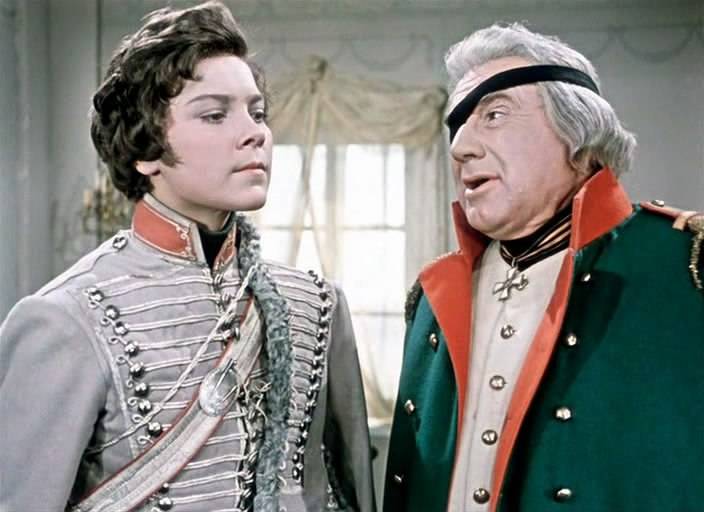
"A girl would be more beautiful!"
The picture was a resounding success. The leader of the rental 1962 of the year, who took second place in the rental by the number of viewers who watched the film - almost 49 million viewers. "Hussar Ballad" received a diploma of the jury of the International Film Festival of comedy films in Vienna in the XXX year.
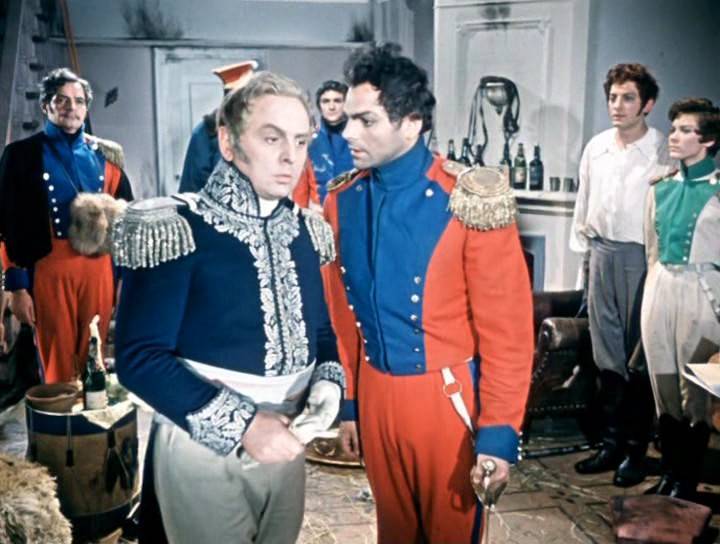
There are few Frenchmen in the movie, but their uniform is well shown. On the left, a general in a silver-embroidered uniform, on the right, a Uhlan lieutenant!
Well, and this film is really a textbook on the military history of 1812, so to speak its visual embodiment. Although ... and on the "Sun there are spots." “Is your uniform Pavlov, of course?”, The lieutenant Rzhevsky asks Shurochka, bearing in mind that she is wearing the uniform of the Pavlograd hussar regiment? And he receives the answer: “Oh no, that is, yes!” And the answer is wrong! She has a beautifully stitched uniform of the Sumy Hussar Regiment - red chakchirs, gray mentik and dolman with gray vypushkami. And why not ask, and also not answer her: “You have Sumy uniform, of course? Oh, no, that is, yes! ”But, alas, then the Soviet cinema was no different in meticulousness in historical“ trifles ”. Of course, the guns in the film also do not roll back when shooting, although what is easier? I tied the cable to the carriage, dust and dust on command - r-time! - soldiers behind the screen jerk pull! But in the sky shrapnels are very naturally torn - the filmmakers have shown themselves as great!
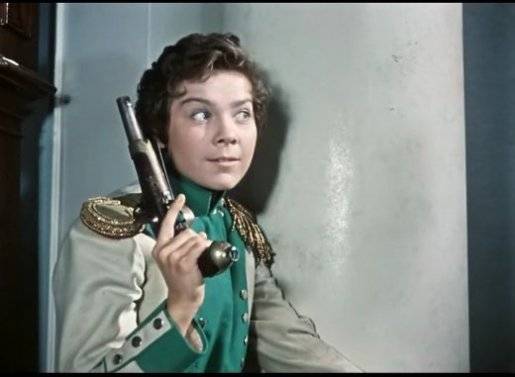
Here it is, "duel woman" Shurochka with a capsule pistol. However, she was given the wrong gun, not just. There was a reason. The "right gun" was too cumbersome and heavy, not at all for a girl's hand!
But what gun should she shoot with! It is true, the French An 9 pistol (French cavalry flintlock pistol model An IX) is 350 mm in length and 17,1-mm in caliber, but ours were about the same! Weight 1,3 kg! See how it looks in the hand of a man 178 in height, see. For Shurochka's hand, this monster would be too big.
Barrel caliber. Not small, right? More than the DShK and PTDD.
Well, these are bullets for this gun. Such a thing will fall into you - it will not find it enough!
Well, now consider its lateral projection.
But such a gun should have been given to Shurochka when she was with the French. After all, they did not have Russian pistols ...
The film clearly shows the pistols from which Shurochka and Rzhevsky are going to shoot. But they ... caps, and in 1812, they were flint! But this is probably all! And so, of course, the film is wonderful: patriotism without pressure, heroic without excessive pathos, people are shown by people, not by poster mannequins, and they play beautifully. In short, this is how we would shoot today's movie!
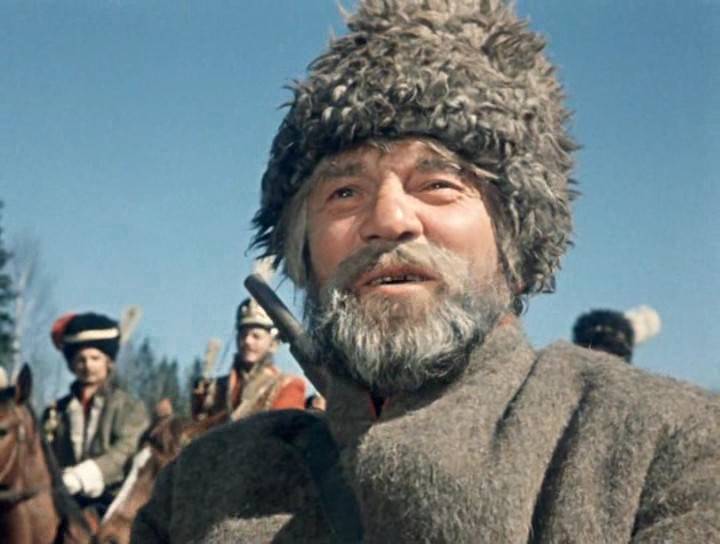
And this is the “people” in the role of the charming Nikolai Kryuchkov. Well, without him? And it is important that at the end of the movie it was he who sings the following verse: “And if the enemy is in blind hope / Russia will come to conquer us again / We will chase him, as before ... / Long time ago ... Long time ago ...
P.S. French flint pistol courtesy of the Penza Museum of the Russian Army.
Fig. A.Shepsa
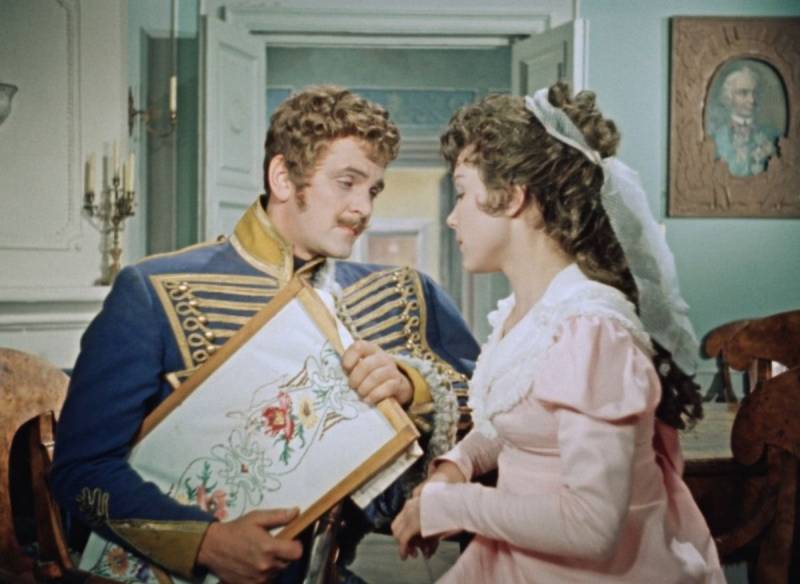
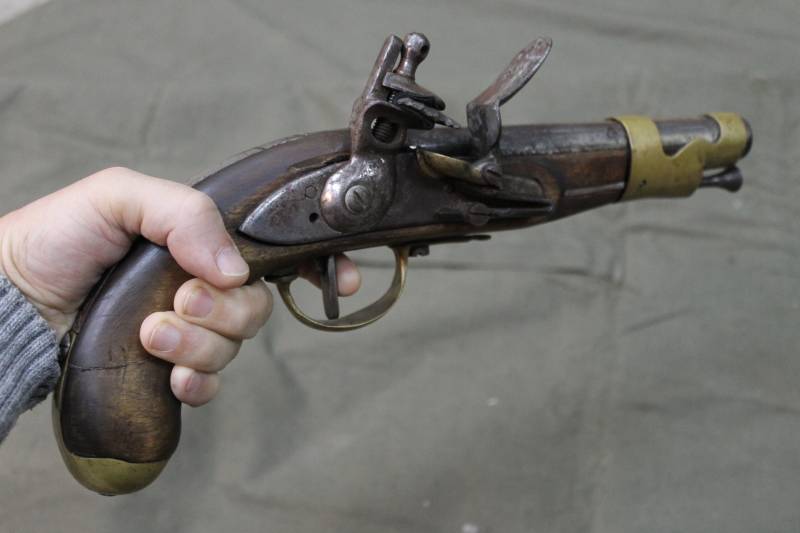
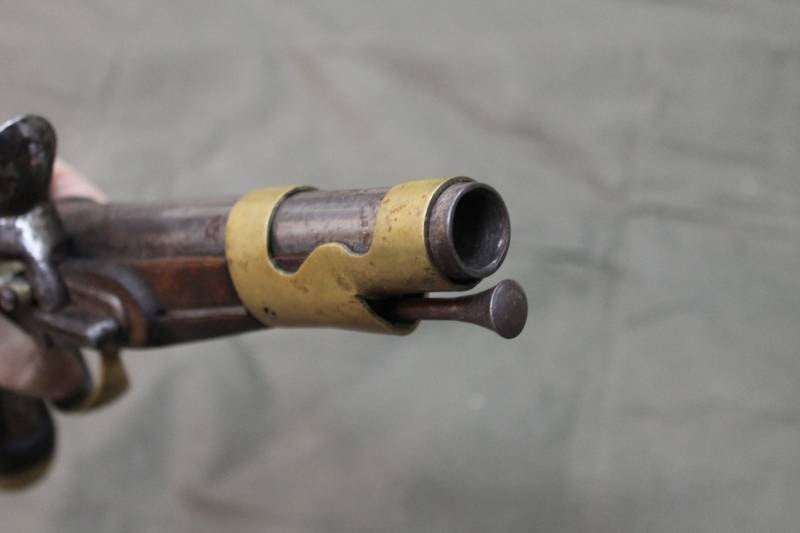
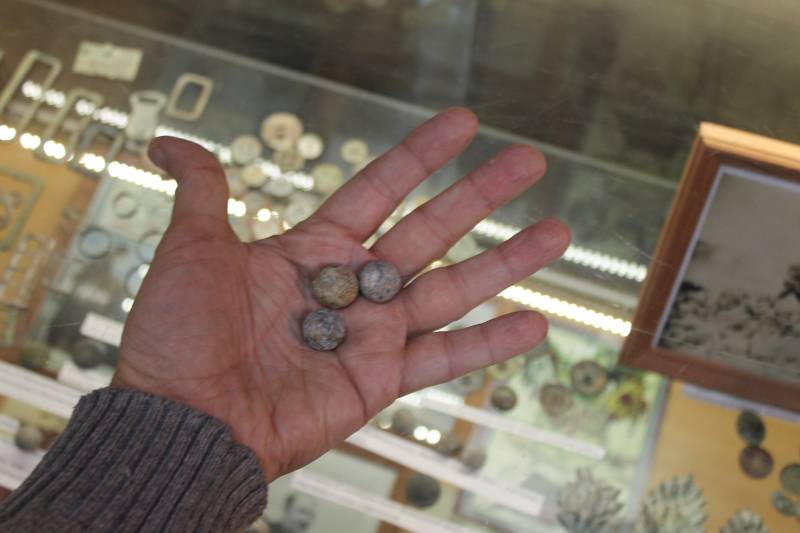
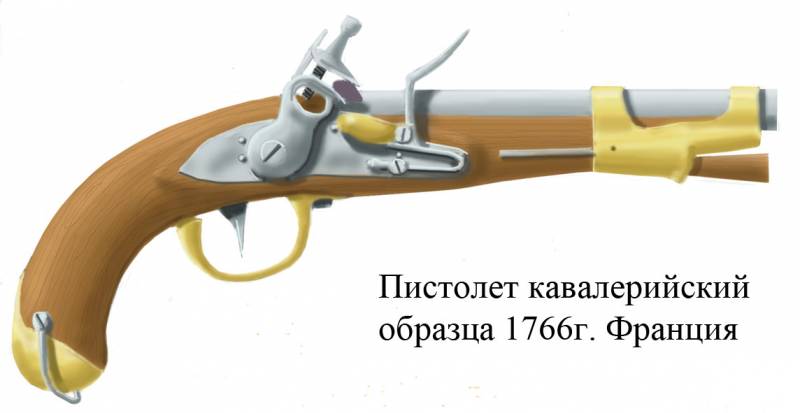
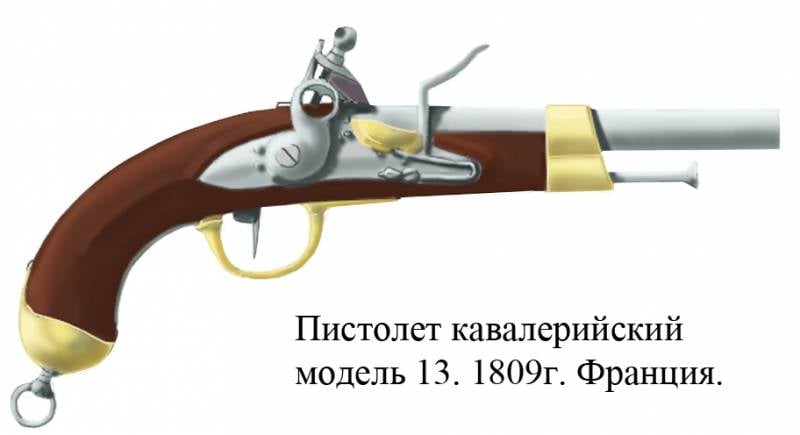
Information